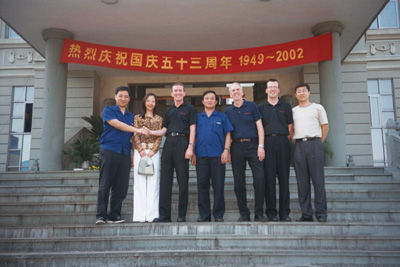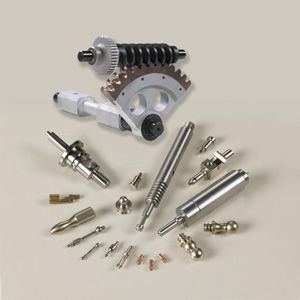Schafer Gears’ partnership with JayPee is an example, even though it doesn’t buy gears from JayPee. Schafer Gear itself manufactures spur, helical, bevel and worm gears, as well as gear shafts, for various uses, including industrial, agricultural, automotive and off-highway applications. Located in South Bend, IN, the company obtains machined forgings for customers with whom it has multi-year contracts for higher-volume production. It doesn’t use JayPee for short-term contracts or for low-volume production.
Bipin N. Doshi, Schafer Gear’s president, explains that it takes time to establish product quality and arrange the logistics of an order. "If every job is different, the technical interaction has to be strong," Doshi says. He adds that: "The reaction time for any engineering changes is longer, and overseas partners cannot react as fast as we can in emergency situations."
However, U.S. and European gear manufacturers can’t decide to transfer their high-volume jobs to countries like China and India just because they see cost savings. For instance, a manufacturer may find a Chinese company able to make a lower-cost gear that meets quality and performance criteria. But the lower cost has to create savings big enough to be an advantage to the U.S. or European company and its customer and big enough to survive the additional costs of foreign manufacture, one obvious cost being shipment from overseas.
"The right combination has to occur for an advantage," Doshi says.
Greater Capacity or Capabilities
Besides cost savings, another advantage of partnering with an Indian or Asian company is increased capacity or capabilities without more capital investment. For example, Schafer Gear added capacity though its other Indian partner, Hi-Tech Gears Ltd. Schafer Gear and Hi-Tech formed their partnership in 2004, when Schafer Gear was trying to win business from a potential customer. Schafer Gear was working with the customer to improve the reliability of one of its gear products, but the customer also wanted to reduce the product’s cost.
Schafer Gear could lower the cost by having Hi-Tech manufacture the product. By partnering with Hi-Tech, Schafer Gear bolstered its chances of winning the customer’s business, but it also gained the capacity of a high-volume manufacturer of automotive gears. This added capacity came without Doshi having to buy any more machines for his factories in South Bend, IN, and Rockford, IL.
Similarly, Precipart extended its capabilities via its GEM Network partners. For example, through these partners, Precipart can supply customers with ground spiral bevel gears and large diameter gears, among many other types, in low to medium volumes even though it may not have these capabilities itself.
"We have additional resources we can draw on that we don’t specifically have in-house, without compromising product quality" says Don Weinzimer, Precipart’s vice president of special programs.
Moreover, Precipart partnered with companies whose capabilities went beyond gear manufacturing.
The advantages of lower-priced products and more capacity or capabilities, however, have to be weighed against the disadvantages of partnering with Indian and Asian companies.
The Time to Qualify Product
Mini Gears’ Darwent says the biggest disadvantage is the time needed to outsource a new gear job with a new gear manufacturer. The U.K. company has more than 12 suppliers in China and does business with 6 or 7 of them on a monthly basis. These suppliers can complete a gear job in six weeks when it’s within their capabilities. When it isn’t, Mini Gears has to look for a new supplier. In that case, the company needs about six months to find and contract with a new Chinese gear manufacturer.
"It means our staff in China has to start from the beginning," Darwent says. And finding a qualified gear manufacturer means paperwork,including pricing information and quality plans from the supplier. "There’s just a whole list of things we’ve got to go through," Darwent says.
Moreover, six months is only the usual amount of time. "It can go up to 9 months," Darwent says.
Communicating with Overseas Partners
Another disadvantage with partners in India and Pacific Rim countries like China and South Korea is the time difference. For example, when Doshi reaches Schafer Gear at 8 a.m. on a Monday, it’s 6:30 p.m. that day in Mumbai (formerly Bombay). JayPee is already closed for the day. Doshi can e-mail and have an answer Tuesday morning, but he can ’t have the immediate give-and-take of a live conversation unless he’s at his office at odd hours, such as 9:30 p.m., which is 8 a.m. the next day in Mumbai. Then Doshi can phone JayPee.
Inventory Management
Doshi points out another disadvantage: inventory management. India is far away, so JayPee can’t provide immediate delivery of gear blanks, even of ones it’s made many times before. Also, flying gear blanks to the U.S. is expensive. So Schafer Gear has to maintain in the U.S. its own inventory of JayPee gear blanks.
"There’s a lot more money tied up in inventory," Doshi says. "That goes into the cost-price question."

Schafer Gear Works uses Indian partner JayPee Forge to obtain lower-priced forgings, then performs the gear-manufacturing operations itself.
Advantages May Disappear
U.S. and European gear manufacturers need to understand that an advantage they have today may be gone tomorrow. That’s what happened to Schafer Gear while partnered with Hi-Tech in an effort to win business from a potential customer. Schafer Gear’s cost savings for the job came from India’s lower price for steel. But steel prices went up, Doshi says, and they rose faster in India than in the U.S. Schafer Gear’s cost advantage disappeared, and the company didn’t win the job.
However, Schafer Gear’s partnership with Hi-Tech didn’t end. "They’re OK with waiting for the right combination," Doshi says.
Also,weighing advantages and disadvantages of partnering with Indian and Asian companies isn’t the end of a U.S. or European gear manufacturer’s work. If partnering is still a good idea, the manufacturer next needs to find partners, make arrangements to facilitate the partnerships and then maintain its relationships with the partners.
Finding Partners
Focused on China, Darwent investigated its gear manufacturing capabilities. He arranged to visit more than a dozen Chinese gear manufacturing companies willing to work with U.S. and European businesses. During his visit, the Mini Gears’ managing director noticed three main things about the companies: 1.) there were as many good companies as there were bad, 2.) there was some automating of manufacture, but 3.) the companies were mainly using mechanical machines to manufacture gears, from turning to gear grinding. Darwent decided China had a large skill base in gear manufacturing and found their use of mechanical machines to be telling.
"Ironically, you need more skill to do that," he says.
Besides finding suitable partners, Darwent had to concern himself with creating a Mini Gears operation in China, specifically a purchasing office. That way, he could have a local employee working directly with Mini Gears’ suppliers. However, that agent had to meet certain requirements.
A Middleman for Mini Gears
To be most useful, the middleman had to be fluent in Chinese and English and had to be an engineer. Also, he’d need to have experience sourcing manufacturers.
The search might’ve taken some time, but Darwent lucked out. He met his future employee at a dinner during his first trip to China. The dinner was hosted by a Chinese company Darwent was visiting. The company was having the dinner for several visiting customers. During the meal, Darwent happened to meet a university-trained engineer who had been working for a large sourcing company for several years. The engineer spoke Chinese and English. Also, Darwent could get a report on the engineer’s competence. His sourcing company’s clients included one of Mini Gears’ main customers.
"They knew him very well and spoke of him very highly," Darwent says. Still, he went through a formal interview in the U.K. with Jason Chen, who now heads Mini Gears’ Shanghai office.
Opening an Overseas Office
To open the office, Mini Gears had to work with the Chinese government, specifically Shanghai’s regional government. "You need special clearance in China to open up what’s called a representative office, which is what Mini Gears has," Darwent says. "There’s a lot of paperwork involved."
For example, Darwent had to provide the regional government with certified copies of Mini Gears accounts from the previous three years to show that it was a financially stable company.
Darwent says he was surprised at how much information the government asked for, but he guessed the government asked for so much because it didn’t want to permit small agents to enter the business community, buy product, then disappear after a few months without paying their bills. "The authorities are looking for professional companies who are investing for the long term."
Working with the Government
Meeting the government’s requirements and getting its approval took about six months. But Darwent wasn’t unhappy about the amount of time. He says he’s heard of companies having to wait 12-18 months to open their own operations in China. Also, Darwent and Chen were busy visiting gear manufacturing companies to review them as potential suppliers. Naturally, this required Darwent to fly back and forth to China. "The six months passed very quickly," Darwent says.
After receiving approval, Mini Gears had less paperwork to file with the government to meet continuing legal requirements. "The paperwork isn’t too bad," Darwent says. The company files paperwork with the government at the end of each year, including an abbreviated set of accounts of business done or in progress in China. Also, it has to pay taxes for its office employees and withhold money from their paychecks to pay their income taxes. But, Mini Gears pays the office bills from the U.K.
In contrast, Precipart and Schafer Gear didn’t open their own operations, so they don’t have to deal with any Indian and Asian governments. They work with their Indian and Pacific Rim partners, who deal with the governments themselves.
Working with Overseas Operations
Gear manufacturers have to devote time to their overseas partners, but the amount of time can vary. For example, Mini Gears spends a lot of time working with its Chinese partners. That means a number of flights to China for company officers and technical staff. "You do need lots of visits," Darwent says.
Schafer Gear doesn’t visit its forgings partner much, though. Doshi visits JayPee about once a year, but his trips aren’t about the Indian company. Doshi returns to his homeland from time to time and uses the trips as occasions to stop by JayPee. "I don’t make a specific trip for business," he says.
However, his visits are so intermittent because he has no problems with JayPee’s products. If there were issues, Doshi says, he’d likely have to visit more often. As for visiting Hi-Tech: "Until we have a customer, we don’t need to go there."
Precipart meets with its GEM Network partners on an ongoing basis, with meetings at least twice a year, including a main annual meeting in October and a secondary one at another time. These gatherings are in addition to regular communication via e-mail, teleconferences and video conferences. For Precipart, its overseas partnerships have meant more orders.
Likewise, overseas partnerships have helped Mini Gears’ business, allowing it to change its U.K. factory. With its high-volume work done in China, Mini Gears can focus its factory on more specialized, small- to medium-volume gear jobs. It can also concentrate on its specialty, gear rack manufacturing.
In 2003, Mini Gears manufactured 750,000 feet of gear racks. In 2005, it had orders for more than 1.25 million feet. Darwent says Mini Gears has bought three new machines for manufacturing gear racks in the last 12 months, so the company now has seven machines dedicated to cutting gear racks 24 hours a day.
"We intend to keep that completely in the U.K.," he adds.
Moreover, Mini Gears has used some of its China profits to upgrade its U.K. factory, including purchase of a large milling center with a three-meter capacity.
Schafer Gear’s partnership with JayPee has worked out well, too. The South Bend company has been able to obtain lower-priced forgings without sacrificing quality. "Zero quality defect," Doshi says. "They have been very good on quality."
The partnership with Hi-Tech hasn’t worked out as hoped. Schafer Gear hasn’t made money from it, but it hasn’t lost any, either. And if the right order comes along, Schafer Gear has a qualified supplier standing by. "We feel that once we get the right opportunity," Doshi says, "we’ll get approval pretty fast."
However, Doshi points out a must-have from all overseas partners: "If the quality lacks, then the other advantages aren’t worthwhile."
For more information:
Mini Gears (Stockport) Ltd.
Top Gear House, Bletchley Road
Heaton Mersey Industrial Estate
Stockport, SK4 3ED
England
Phone: +(44) 161-432-0222
Fax: +(44) 161-432-0444
E-mail: enquiries@minigears.co.uk
Internet: www.minigears.co.uk
Precipart Corp.
90 Finn Court
Farmingdale, NY 11735
Phone: (631) 694-3100
Fax: (631) 694-4016
Internet: www.precipart.com
Schafer Gear Works Inc.
4701 Nimtz Parkway
South Bend, IN 46628
Phone: (574) 234-4116
Fax: (574) 234-4115
Internet: www.schafergear.com








